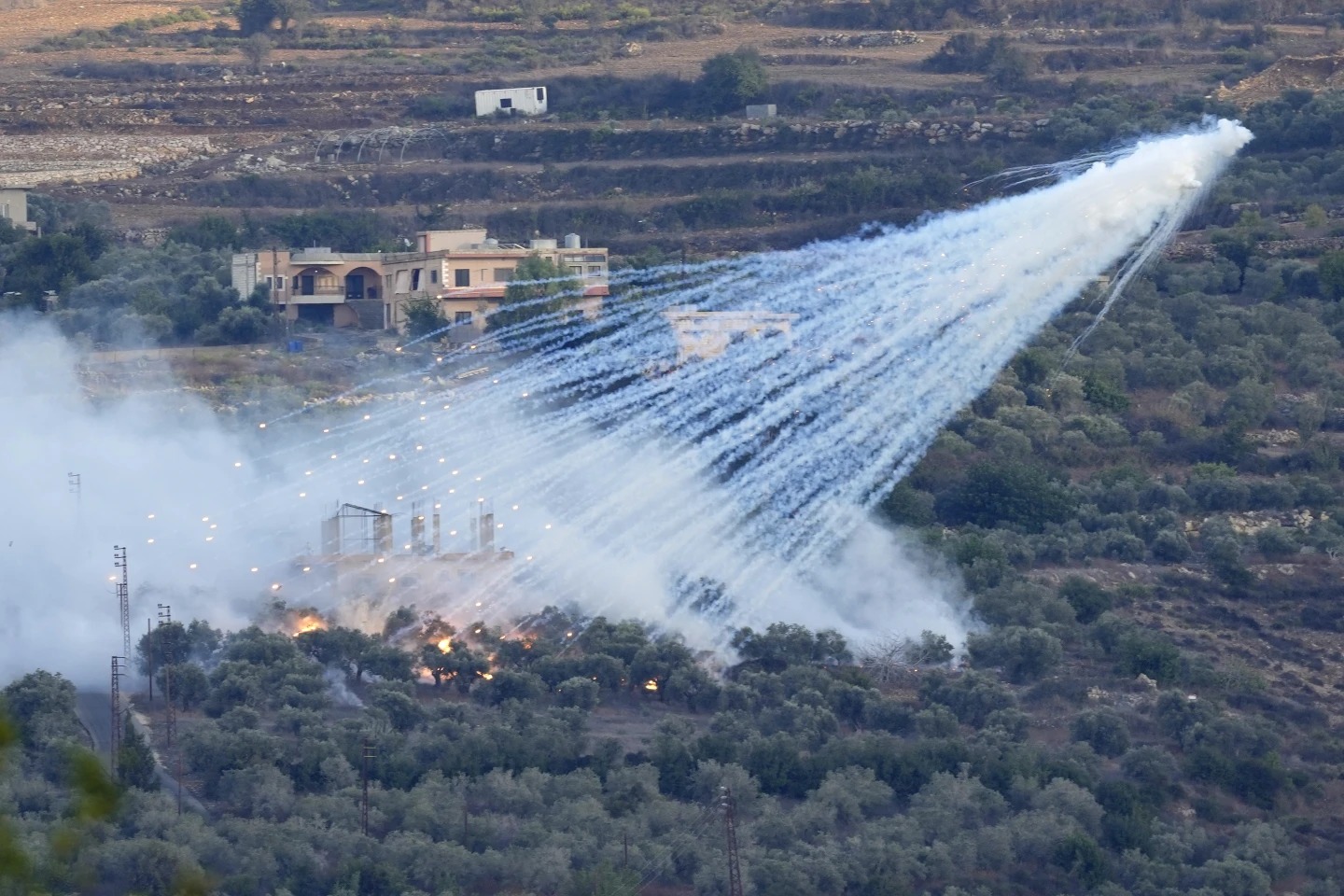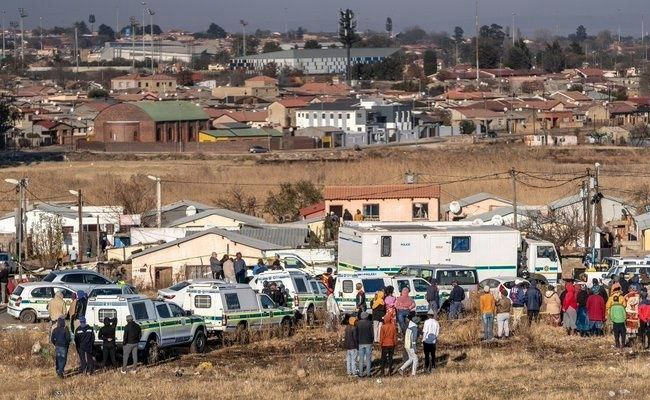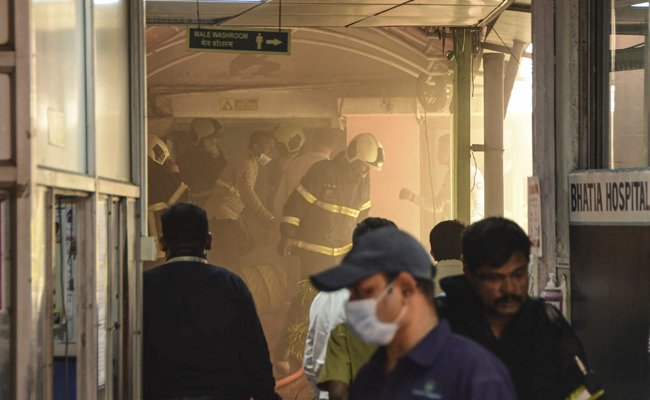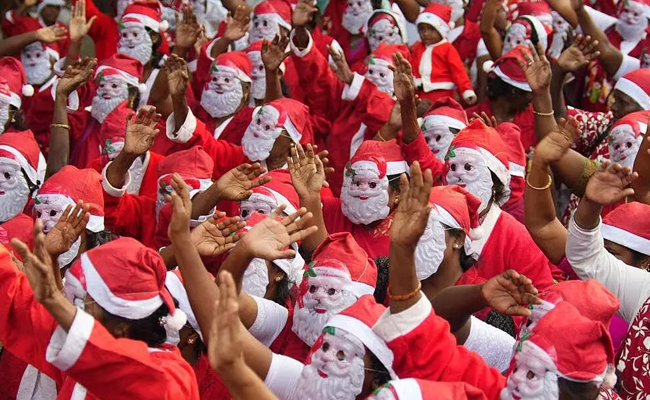Jerusalem (AP): Israel launched a wave of airstrikes across southern Lebanon early Sunday in what it said was a preemptive strike on Hezbollah. The militant group responded that it had launched hundreds of rockets and drones to avenge the killing of one of its top commanders last month.
The heavy exchange of fire does not appear to have ignited a long-feared war, but the situation remains tense. Meanwhile, Egypt on Sunday is hosting high-level talks aimed at brokering a cease-fire in the 10-month-old Israel-Hamas war in Gaza, which diplomats hope will tamp down regional tensions.
The Israeli military said it struck because Hezbollah was planning to launch a heavy barrage of rockets and missiles toward Israel. Soon after, Hezbollah announced it had launched an attack on Israeli military positions as an initial response to the killing of Fouad Shukur, one of its founding members, in an Israeli airstrike in Beirut last month.
By mid-morning, it appeared that the exchange had ended, with both sides saying they had only aimed at military targets. At least three people were killed in the strikes on Lebanon, while there were no reports of casualties in Israel.
Israeli Prime Minister Benjamin Netanyahu, speaking at the start of a Cabinet meeting, said the military had eliminated “thousands of rockets that were aimed at northern Israel” and urged citizens to adhere to directives from the Home Front Command.
“We are determined to do everything to defend our country, to return the residents of the north securely to their homes and to continue upholding a simple rule: Whoever harms us — we will harm them,” he said.
Air raid sirens and flight diversions
Air raid sirens were reported throughout northern Israel, and Israel's Ben-Gurion international airport closed and diverted flights for approximately an hour due to the threat of attack. Israel's Home Front Command raised the alert level across northern Israel before later lifting restrictions in most areas.
Lt. Col. Nadav Shoshani, an Israeli military spokesman, said Hezbollah had intended to hit targets in northern and central Israel. He said initial assessments found “very little damage” in Israel, but that the military remained on high alert. He said around 100 Israeli aircraft took part in Sunday's strikes.
Lebanon's Health Ministry reported that two people were killed and another two wounded in the strikes in southern Lebanon. Separately, a fighter for the Amal group, which is allied with Hezbollah, was killed in a strike on a car, Amal said.
Hezbollah said its attack involved more than 320 Katyusha rockets aimed at multiple sites in Israel and a “large number” of drones. It said the operation was targeting “a qualitative Israeli military target that will be announced later” as well as “enemy sites and barracks and Iron Dome (missile defence) platforms.”
Hezbollah said the strikes would allow it to launch more attacks deeper into Israel, but a later statement said “military operations for today have been completed.”
The militant group said it targeted 11 bases, barracks and military positions in northern Israel and the Israeli-annexed Golan Heights, and dismissed Israel's claim to have thwarted a stronger attack. Hezbollah did not provide evidence for its claims.
Hezbollah's leader, Hassan Nasrallah, was expected to give a speech later on Sunday.
After an emergency government meeting, Lebanon's caretaker Economy Minister Amin Salam said officials were “feeling a bit more optimistic” about a de-escalation.
“We feel more reassured since both sides confirmed that the expected operations ended, and we know that the negotiations in Cairo are very serious,” he said.
In the US, a spokesman for the National Security Council, Sean Savett, said President Joe Biden was “closely monitoring events in Israel and Lebanon.”
The Pentagon said Defence Secretary Lloyd Austin spoke with his Israeli counterpart, Yoav Gallant, about Israel's defenses. The chairman of the Joint Chiefs of Staff, Gen. CQ Brown, is on a visit to the region that is expected to take him to Israel, Egypt and Jordan.
All-out war seems to have been averted for now
In recent weeks, diplomats from the US and European countries have made a flurry of visits to Israel and Lebanon in an attempt to tamp down the escalation that they fear could spiral into a regional war.
Randa Slim, a senior fellow at the Washington, DC-based Middle East Institute, said Sunday morning's exchange was “still within the rules of engagement and unlikely at this point to lead to an all out war.”
Danny Citrinowicz, an expert at Israel's Institute for National Security Studies, said Hezbollah might be trying to “balance the equation without escalating into war.” Each side is now hoping their narrative will be sufficient for them to declare victory and avoid a wider confrontation, he said.
Hezbollah began attacking Israel almost immediately after the start of the war in Gaza, which was triggered by Hamas' October 7 attack into Israel. Israel and Hezbollah have been exchanging fire almost daily, displacing tens of thousands of people on both sides of the border.
Hezbollah, which fought Israel to a stalemate in the summer of 2006, is believed to be far more powerful than it was during that conflict. The United States and Israel estimate it has some 150,000 rockets and is capable of hitting anywhere inside Israel. The group has also developed drones capable of evading Israel's defences, as well as precision-guided munitions.
Israel has one of the world's best militaries and an extensive multi-tiered missile defense system, and it is backed by a US-led coalition that helped it shoot down hundreds of missiles and drones fired from Iran earlier this year. The US military has been building up its forces across the region in recent weeks.
Israel has vowed a crushing response in the case of all-out war, one that would likely demolish critical civilian infrastructure, especially in south Beirut and southern Lebanon, where Hezbollah's main strongholds are located. A war would likely displace hundreds of thousands of people on both sides.
Hezbollah is a close ally of Iran, which has also threatened to retaliate for the killing of a senior Hamas leader, Ismail Haniyeh, in an explosion in Tehran last month that was widely blamed on Israel, which has not said whether it was involved.
Iranian state media on Sunday played up the Hezbollah attack, calling it a success, but there was no immediate comment from Iranian officials.
Egypt hosts high-level Gaza talks
The US and other mediators see a cease-fire in Gaza as key to heading off a wider Mideast conflagration. Hezbollah has said it will halt its strikes on Israel if there is a cease-fire in Gaza, and Hezbollah and Iran might delay or scale back any retaliatory strikes over Shukur and Haniyeh.
Egypt is hosting high-level talks in Cairo on Sunday aimed at bridging the gaps in an evolving proposal for a truce and the release of scores of hostages held by Hamas.
The talks were to be attended by CIA director William Burns, Qatari Prime Minister Mohammed bin Abdulrahman Al Thani and Egypt's chief intelligence official, Abbas Kamel, according to two Egyptian officials who spoke on condition of anonymity to discuss the sensitive negotiations. The head of Israel's Mossad intelligence agency, David Barnea, is also expected to attend, they said.
Hamas sent a delegation to the Egyptian capital to be briefed by Egyptian and Qatari mediators but is not directly taking part in the negotiations.
Let the Truth be known. If you read VB and like VB, please be a VB Supporter and Help us deliver the Truth to one and all.
Johannesburg (AP): A 32-year-old suspect has been arrested in connection with a mass shooting which claimed the lives of 12 people including three children at an unlicensed pub earlier this month, South African police said on Monday.
The man is suspected of being one of the three people who opened fire on patrons in a pub at Saulsville township, west of South Africa's capital Pretoria, killing 12 people including three children aged 3, 12 and 16.
At least 13 people were also injured during the attack, whose motive remains unknown.
According to the police, the suspect was arrested on Sunday while traveling to Botlokwa in Limpopo province, more than 340 km from where the mass shooting took place on Dec 6.
An unlicensed firearm believed to have been used during the attack was recovered from the suspect's vehicle.
“The 32-year-old suspect was intercepted by Limpopo Tracking Team on the R101 Road in Westenburg precinct. During the arrest, the team recovered an unlicensed firearm, a hand gun, believed to have been used in the commission of the multiple murders. The firearm will be taken to the Forensic Science Laboratory for ballistic analysis,” police said in statement.
The suspect was arrested on the same day that another mass shooting at a pub took place in the Bekkersdal township, west of Johannesburg, in which nine people were killed and 10 wounded when unknown gunmen opened fire on patrons.
Police have since launched a search for the suspects.
South Africa has one of the highest homicide rates in the world and recorded more than 26,000 homicides in 2024 — an average of more than 70 a day. Firearms are by far the leading cause of death in homicides.
The country of 62 million people has relatively strict gun ownership laws, but many killings are committed with illegal guns, according to authorities.
According to police, mass shootings at unlicensed bars are becoming a serious problem. Police shut down more than 11,000 illegal taverns between April and September this year and arrested more than 18,000 people for involvement in illegal liquor sales.





